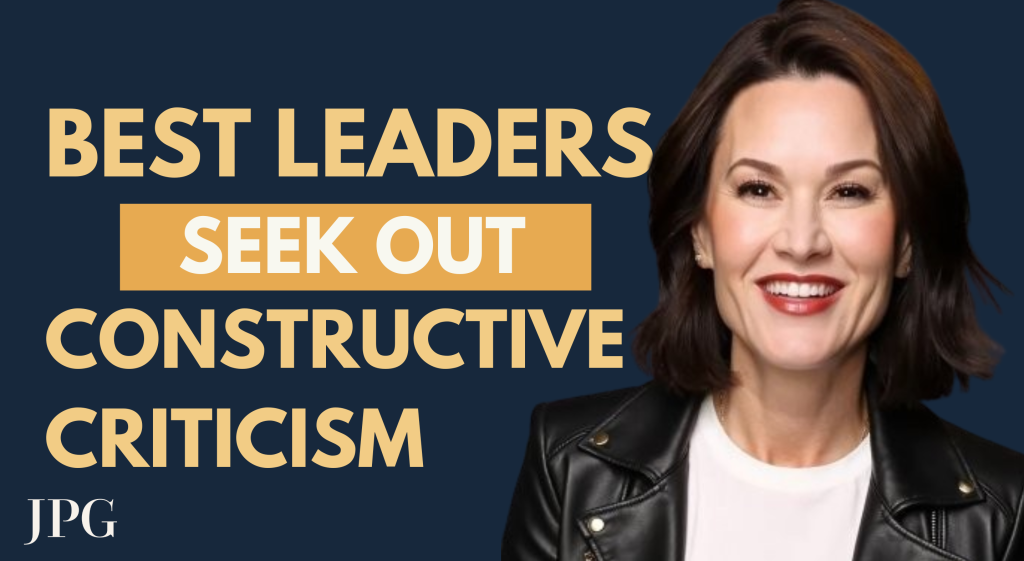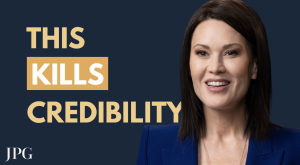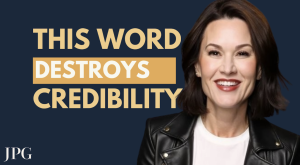Learning How to Take Constructive Criticism is What Separates Top Executives from Everyone Else
At JPG, we coach executives who lead Fortune 500 companies, lead multi-billion-dollar companies, are taking their company public, looking for investors, and influence policy at the highest levels of government and industry.
The majority of them share one common trait: They actively seek out the feedback that makes everyone else uncomfortable.
That’s why they come to us.
Before a group corporate training, I sometimes ask: “What have you heard about this training?”
I get many of the same answers, but the biggest one is, “Get ready to be uncomfortable.”
After more than a decade coaching leaders at the highest levels, I’ve learned feedback should be treated like competitive intelligence. The executives who command respect in boardrooms, influence major decisions, and inspire unwavering loyalty all share this.
Your relationship with criticism determines your ceiling as a leader. Here are the strategies that separate feedback-driven leaders from everyone else.
How to Learn From Constructive Criticism and Turn It into Your Career Accelerator
Every quarter, the same scene plays out in corporate conference rooms across the country. Performance reviews happen, 360-degree feedback gets delivered, and most executives spend their energy explaining why the criticism doesn’t apply to them.
This is perhaps the most expensive mistake you can make for your leadership development.
Every time you deflect feedback, you’re not just missing an opportunity for improvement — you’re advertising to your organization that you’ve stopped growing. Meanwhile, your competitors who embrace criticism are rapidly closing skill gaps and expanding their influence.
The hidden cost of shrugging off feedback compounds quickly.
Your blind spots become organizational liabilities instead of personal growth opportunities. You develop defensive habits that erode trust with your team. Most damaging of all, you signal to senior leadership that you’re not coachable, which means you get passed over for stretch assignments and advancement opportunities.
Your Playbook for Learning from Feedback
The most strategic leaders approach criticism like market research.
- Direct feedback from superiors reveals expectations and advancement criteria you might be missing.
- Peer criticism exposes collaboration blind spots that could derail major initiatives.
- Team feedback uncovers leadership gaps that directly impact performance and retention.
- Client criticism provides market intelligence about your professional brand and effectiveness.
The Art of Listening Without Getting Offended
Here’s what most executives miss entirely: The moment you feel defensive about feedback, you’ve stopped learning from it.
Your emotional reaction to criticism becomes more important than the content itself. When someone points out a weakness in your presentation style, questions your decision-making process, or challenges your strategic thinking, your brain’s first impulse is self-protection. You start building counterarguments instead of extracting insights.
But here’s the thing: The feedback that triggers your strongest defensive response usually contains your most valuable growth opportunities.
That criticism about your tendency to interrupt team members during meetings? It’s revealing a leadership blind spot that’s limiting your team’s contribution and innovation. The feedback about your presentations being too detailed for executive audiences? It’s highlighting a communication gap that could be costing you influence at the highest levels.
Turning Constructive Feedback into Career-Changing Action
Your ability to convert criticism into measurable behavior change shows up in every leadership opportunity you’re offered, every promotion you’re considered for, and every relationship that could advance your influence.
Leaders who master feedback implementation don’t just perform better — they develop the growth mindset and adaptability that make them irreplaceable during times of change and opportunity.
The most effective approach involves treating feedback like actionable business intelligence rather than personal attacks to survive. Create specific implementation plans with measurable outcomes and accountability systems. Maybe you’re working to reduce interruptions during team meetings by 80%, or perhaps you’re focused on adapting your communication style for different executive audiences.
The Implementation Framework That Accelerates Growth
Transform every piece of feedback into a strategic development initiative.
- Immediate acknowledgment demonstrates leadership maturity and openness to growth.
- Clarifying questions ensure you understand the specific behaviors and impacts involved.
- Implementation timeline creates accountability and shows commitment to change.
- Progress check-ins maintain momentum and demonstrate sustained improvement efforts.
- Impact measurement proves behavior change and reinforces the value of feedback.
Not All Feedback Deserves Equal Weight — Here’s How to Tell the Difference
The most sophisticated leaders know that embracing feedback doesn’t mean accepting every piece of criticism uncritically.
Trust feedback from people with direct observation of your work, a track record of developing others, and no ulterior motives. The best feedback is specific rather than vague, focuses on observable behaviors rather than character attacks, and comes from sources who’ve demonstrated their own growth mindset.
Be cautious of criticism that’s entirely subjective with no concrete examples, delivered by someone with a competing agenda, or rooted in personal style preferences rather than performance impact. The key distinction: Good feedback makes you uncomfortable because it’s true and actionable. Bad feedback makes you confused because it’s inconsistent with multiple other data points or lacks any path forward. When in doubt, look for patterns — if three trusted colleagues independently identify the same issue, that’s intelligence worth acting on immediately.
Ready to Transform Your Leadership Impact?
At JPG, we’ve helped leaders turn their biggest feedback challenges into their greatest strengths. We’ve coached rising executives through feedback implementations that accelerated their promotions. We’ve prepared senior leaders to receive and act on board-level criticism that transformed their strategic thinking.
The difference between good leaders and unforgettable ones isn’t perfection — it’s their response to imperfection.
Whether you’re navigating complex stakeholder feedback, implementing board-level strategic criticism, or building a culture where your team feels safe giving you honest input, we’ll help you master the feedback skills that separate industry leaders from everyone else.
Contact JPG today for a strategic consultation. Because the leaders who shape industries never stop learning.





